International Toy Fair Nuremberg 2010
Internationale Spielwarenmesse Nürnberg 2010
| x |
|
|
|
|
|
|
|
|
|
|
|
|
|
|
|
|
|
|
|
|
|
|
|
|
|
|
|
|
|
|
|
|
|
| What's Your Game? |
|
| x |
|
|
|
|
|
|
|
|
|
|
|
|
|
|
|
|
|
|
|
|
|
|
|
|
|
|
|
|
|
|
|
|
|
| The publisher stresses that the game is still under development, both in fine tuning as well as for the graphics. |
|
| x |
|
|
|
|
|
|
|
|
|
|
|
|
|
|
|
|
|
|
|
|
|
|
|
|
|
|
|
|
|
|
|
|
|
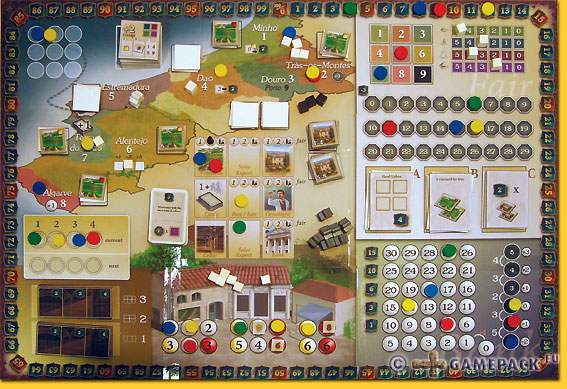 |
| x |
|
|
|
|
|
|
|
|
|
|
|
|
|
|
|
|
|
|
|
|
|
|
|
|
|
|
|
|
|
|
|
|
|
|
The game is about trading wine, and lasts six years of three phases each. In the first and second phase players place a disc in an area of their choice; this is the action they want to perform: either buying a vineyard, sell to the local market, buy a cottage, hire an oenologist, buy extra storage, sell abroad or deal with the bank. In the third phase, there is a harvest and the wines will be produced. After the third, fifth and sixth year there is a fair.
|
|
| x |
|
|
|
|
|
|
|
|
|
|
|
|
|
|
|
|
|
|
|
|
|
|
|
|
|
|
|
|
|
|
|
|
|
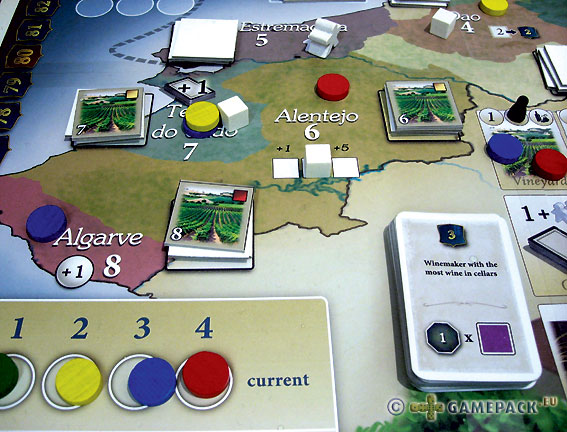 |
| x |
|
|
|
|
|
|
|
|
|
|
|
|
|
|
|
|
|
|
|
|
|
|
|
|
|
|
|
|
|
|
|
|
|
|
When buying a vineyard, players may choose any of the face up vineyard tiles; a vineyard costs five money. Players put their disc in the wine area so it is clear to all other players at which wine they are working on.
Each vineyard has its own speciality, e.g. Dão wine enables a player to sell the wine for an additional 2 VP’s if he keeps it stored for two years. Cottages and oenologists cost two money each. It is necessary to have a cottage in order to hire a oenologist.
|
|
| x |
|
|
|
|
|
|
|
|
|
|
|
|
|
|
|
|
|
|
|
|
|
|
|
|
|
|
|
|
|
|
|
|
|
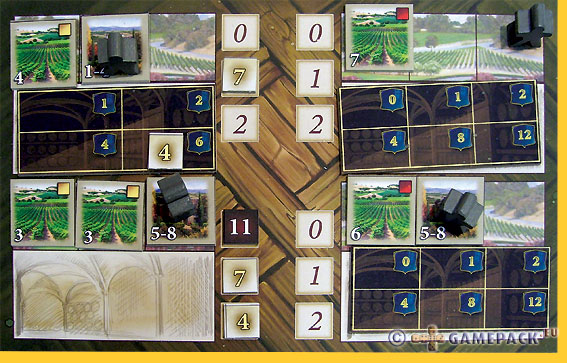 |
| x |
|
|
|
|
|
|
|
|
|
|
|
|
|
|
|
|
|
|
|
|
|
|
|
|
|
|
|
|
|
|
|
|
|
|
The production of wine, made in the third phase of each year, is marked with chits that can be stored in a cellar that has to be bought first to age and make the wine more valuable.
Each vineyard has a production value of two, the cottage gives one extra production, and the oenologist two. The oenologist each year has to be paid two money from the bank. The production value is then adjusted according to a 'forecast' tile that was laid out at the start of each year.
|
| x |
|
|
|
|
|
|
|
|
|
|
|
|
|
|
|
|
|
|
|
|
|
|
|
|
|
|
|
|
|
|
|
|
|
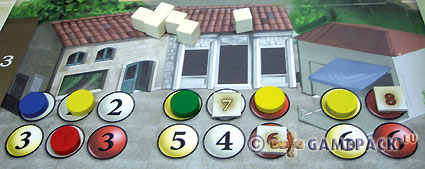 |
|
The wine can be offered at restaurants, café’s and bars, each having their own minimum demand and the maximum amount that they will pay; if a player for example sells a wine that is worth 8 in a slot that indicates 5, he will only gain 5. |
| x |
|
|
|
|
|
|
|
|
|
|
|
|
|
|
|
|
|
|
|
|
|
|
|
|
|
|
|
|
|
|
|
|
|
Revenues are transferred to the bank.
Wine can also be exported. In this case players gain an amount of victory points equal to the value of the wine. |
| x |
|
|
|
|
|
|
|
|
|
|
|
|
|
|
|
|
|
|
|
|
|
|
|
|
|
|
|
|
|
|
|
|
|
| On a separate track, bonds can be bought that may generate interest, or, if a player sells too many bonds, negative interest. Players have to use cash money to buy vineyards, cottages or to hire oenologists so they have to withdraw money from the bank or sell their bonds. |
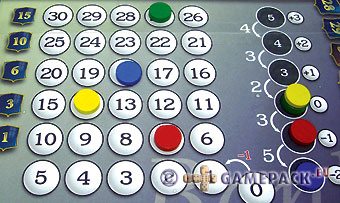 |
| x |
|
|
|
|
|
|
|
|
|
|
|
|
|
|
|
|
|
|
|
|
|
|
|
|
|
|
|
|
|
|
|
|
|
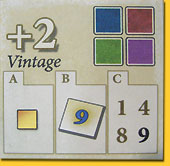 |
The player order is important to be able to be the first to send a wine to the fair from a given area if there also are other players with wines in that area, or to sign a contract before any other players.
The 'forecast' tile also states the requirements to take advantages of some contracts offered at the fair such as ‘Hotel Lisboa has an extra demand, and if fully serviced, gains a player 4 additional VP’s’.
|
| x |
|
|
|
|
|
|
|
|
|
|
|
|
|
|
|
|
|
|
|
|
|
|
|
|
|
|
|
|
|
|
|
|
|
| After the third, the fifth and the sixth year, a fair is held that is important to gain victory points. Players put their wine chits on the fair, and take as many fair point as the value of their chits. Whoever ends highest on this track, wins a gold medal, the second wins the silver and the third the bronze one. At the end of the game those medals will give extra points according to both the total number of medal gained and type (gold, silver or bronze). |
|
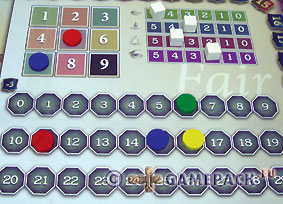 |
| x |
|
|
|
|
|
|
|
|
|
|
|
|
|
|
|
|
|
|
|
|
|
|
|
|
|
|
|
|
|
|
|
|
|
|
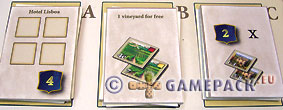
|
Also during the game special cards can be bought to gain extra points at the fair. |
| x |
|
|
|
|
|
|
|
|
|
|
|
|
|
|
|
|
|
|
|
|
|
|
|
|
|
|
|
|
|
|
|
|
|
| Here players choose their action for a turn. |
|
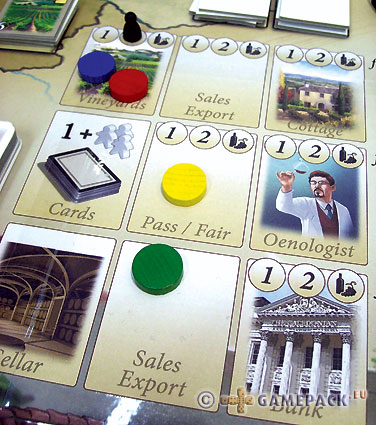 |
| x |
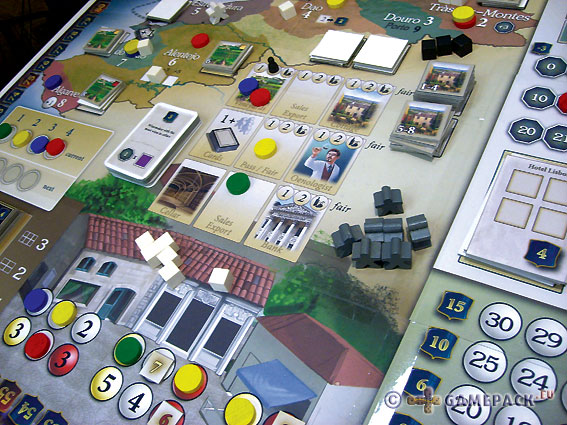 |
| x |
| As said, many things may change. What is sure, however, is the name of the game: it definitely will not be called Vinicola. |
| x |
|
|
|
|
|
|
|
|
|
|
|
|
|
|
|
|
|
|
|
|
|
|
|
|
|
|
|
|
|
|
|
|
|
Vinicola, Vital Lacerdo, What's Your Game?, 2010 - 2 to 4 players, 12 years and up, 120 minutes |
| x |
|
|
|
|
|
|
|
|
|
|
|
|
|
|
|
|
|
|
|
|
|
|
|
|
|
|
|
|
|
|
|
|
|
| x |
|
|
|
|
|
|
|
|
|
|
|
|
|
|
|
|
|
|
|
|
|
|
|
|
|
|
|
|
|
|
 |
|
|
|
|
|
|
|
|
|
|
|
|
|
|
|
|
|
|
|
|
|
|
|
|
|
|
|
|
|
|
|
|
 |
|
|
|
|
|
|
|
|
|
|
|
|
|
|
|
|
|
|
|
|
|
|
|
|
|
|
|
|
|
|
|
|
 |
|
|
|
|
|
|
|
|
|
|
|
|
|
|
|
|
|
|
|
|
|
|
|
|
|
|
|
|
|
|
|
|
 |
|
|
|
|
|
|
|
|
|
|
|
|
|
|
|
|
|
|
|
|
|
|
|
|
|
|
|
|
|
|
| x |
|
|
|
|
|
|
|
|
|
|
|
|
|
|
|
|
|
|
|
|
|
|
|
|
|
|
|
|
|
|
|
|
|
 |
|
|
|
|
|
|
|
|
|
|
|
|
|
|
|
|
|
|
|
|
|
|
|
|
|
|
|
|
|
|
|
|
|
|
|
|
|
|
|
|
|
|
|
|
|
|
|
|
|